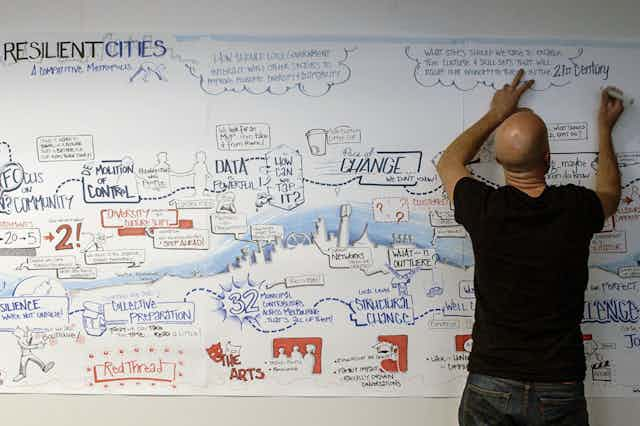The selection of Melbourne to participate in the international 100 Resilient Cities program sponsored by the New York-based Rockefeller Foundation generated a mix of hopes, expectations and concerns.
In a report released today, researchers assessing the program found a surprising degree of co-operation among the city’s many local councils. The result is the Resilient Melbourne Strategy, adopted this month, which marks a shift towards “whole-of-city” thinking.
In 2013, at the time of Melbourne’s selection, its fragmented governance was a concern. How could a framework for urban resilience emanating from the US be adapted to very different city governance structures operating in Melbourne? What could a single chief resilience officer (CRO) hope to accomplish in just two years across a metropolitan region with more than 30 local government authorities?
The Melbourne project began in earnest with the appointment of the CRO, housed at the City of Melbourne, in November 2014. A year later an RMIT University research team interviewed a wide range of people who were either closely involved with or clearly interested in the project implementation. Interviewees include those serving on the project steering committee, some who had attended a project briefing and some who had only been told about it.
Overcoming fragmented governance
It is fair to say the researchers were sceptical about what could be achieved in just two years to foster a city-wide approach to urban resilience. In Australia’s rather cumbersome, three-tiered structure of government it is hard to focus on metropolitan regions that fall somewhere between the responsibilities of state and local governments. Thinking about cities as a whole has only just entered the strategic thinking of our national governments.
Yet the researchers were pleased to find the project had generated unprecedented levels of co-operation involving 29 local government authorities in metropolitan Melbourne. The implementation process had met with widespread approval.
Each of the 100 cities now participating in the Resilient Cities Challenge is provided with a “City Resilience Framework”. This guides development of a specific strategy for the city.
Adapting to local conditions
The framework draws heavily on US experiences – especially that of New Orleans since the devastation of Hurricane Katrina in 2005. The Melbourne steering committee realised it would have to adapt the framework considerably to work in a city with 32 local councils.
In Toby Kent, the project initiators selected a CRO who had evident skills in motivation and negotiation. The researchers were told that the patient work involved in building collaboration across so many local government areas made the project stronger than it would have been otherwise.
The concept of urban resilience promoted by the Rockefeller Foundation urges cities to consider a wide range of potential “shocks” and accumulating “stresses”. The research found this approach promoted boundary-crossing dialogues. These exchanges involved people concerned with infrastructure planning, economic development, social care, community development and environmental protection.
Some of the interviewees expressed misgivings about the growing popularity of the concept of resilience in policy discourses. Despite this, the research findings suggest it does have a capacity to get people thinking beyond the normal boundaries of policy and practice.
Towards a more holistic view
In Australia, the concept of resilience has largely been associated with emergency management. However, the semi-structured research interviews tended to focus more on accumulating social, economic and physical stresses. These make the city as a whole more vulnerable, but are often neglected.
It was noted, for example, that urban planning can leave many people feeling socially isolated. One council has now applied “a lens of preventing family violence” into all areas of its work, ranging from infrastructure planning and economic development through to health promotion and community development.
The Resilient Melbourne project released a preliminary resilience assessment in June 2015. This was developed into the newly launched Resilient Melbourne Strategy.
Much of this strategy aims to “scale up” existing projects or initiatives. The aim is to demonstrate that these can be more effective on a metropolitan rather than localised scale.
Follow-up research will be needed to find out which elements of the strategy become embedded in the policies and practices of Melbourne’s local government authorities and the multitude or public and private sector organisations trying to ensure that vulnerabilities are addressed long before they become full-blown crises.
Importantly, the research found that the project was able to generate some innovative policy and practice dialogues and demonstrate the benefits of whole-of-city thinking.

